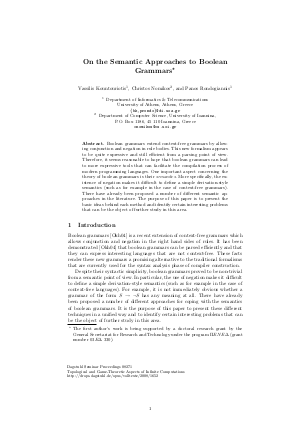On the Semantic Approaches to Boolean Grammars
Authors Vassilis Kountouriotis, Christos Nomikos, Panos Rondogiannis
-
Part of:
Volume:
Dagstuhl Seminar Proceedings, Volume 8271
Part of: Series: Dagstuhl Seminar Proceedings (DagSemProc) - License:
 Creative Commons Attribution 4.0 International license
Creative Commons Attribution 4.0 International license
- Publication Date: 2008-11-05
File

PDF
DagSemProc.08271.6.pdf
- Filesize: 230 kB
- 12 pages
Document Identifiers
Subject Classification
Keywords
- Boolean Grammars
- Negation in Formal Grammars
- Well-Founded Semantics
Metrics
- Access Statistics
-
Total Accesses (updated on a weekly basis)
0PDF Downloads0Metadata Views
Abstract
Boolean grammars extend context-free grammars by allowing conjunction and negation in rule bodies. This new formalism appears to be quite expressive and still efficient from a parsing point of view. Therefore, it seems reasonable to hope that boolean grammars can lead to more expressive tools that can facilitate the compilation process of modern programming languages. One important aspect concerning the theory of boolean grammars is their semantics. More specifically, the existence of negation makes it difficult to define a simple derivation-style semantics (such as for example in the case of context-free grammars). There have already been proposed a number of different semantic approaches in the literature. The purpose of this paper is to present the basic ideas behind each method and identify certain interesting problems that can be the object of further study in this area.
Cite As Get BibTex
Vassilis Kountouriotis, Christos Nomikos, and Panos Rondogiannis. On the Semantic Approaches to Boolean Grammars. In Topological and Game-Theoretic Aspects of Infinite Computations. Dagstuhl Seminar Proceedings, Volume 8271, pp. 1-12, Schloss Dagstuhl – Leibniz-Zentrum für Informatik (2008)
https://doi.org/10.4230/DagSemProc.08271.6
BibTex
@InProceedings{kountouriotis_et_al:DagSemProc.08271.6,
author = {Kountouriotis, Vassilis and Nomikos, Christos and Rondogiannis, Panos},
title = {{On the Semantic Approaches to Boolean Grammars}},
booktitle = {Topological and Game-Theoretic Aspects of Infinite Computations},
pages = {1--12},
series = {Dagstuhl Seminar Proceedings (DagSemProc)},
ISSN = {1862-4405},
year = {2008},
volume = {8271},
editor = {Peter Hertling and Victor Selivanov and Wolfgang Thomas and William W. Wadge and Klaus Wagner},
publisher = {Schloss Dagstuhl -- Leibniz-Zentrum f{\"u}r Informatik},
address = {Dagstuhl, Germany},
URL = {https://drops.dagstuhl.de/entities/document/10.4230/DagSemProc.08271.6},
URN = {urn:nbn:de:0030-drops-16527},
doi = {10.4230/DagSemProc.08271.6},
annote = {Keywords: Boolean Grammars, Negation in Formal Grammars, Well-Founded Semantics}
}
